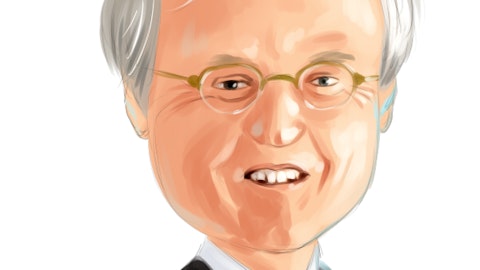Movado Group, Inc. (NYSE:MOV) Q4 2023 Earnings Call Transcript March 23, 2023
Operator: Good morning, everyone, and welcome to the Movado Group, Inc. Fourth Quarter 2023 Earnings Conference Call. As a reminder, today’s call is being recorded and may not be reproduced in whole or in part without permission from the company. At this time, I’d like to turn the call over to Rachel Schacter of ICR. Please go ahead.
Rachel Schacter: Thank you. Good morning, everyone. With me on the call is Efraim Grinberg, Chairman and Chief Executive Officer; and Sallie DeMarsilis, Executive Vice President, Chief Operating Officer and Chief Financial Officer. Before we get started, I would like to remind you of the company’s Safe Harbor language, which I am sure you are all familiar with. The statements contained in this conference call, which are not historical facts, may be deemed to constitute forward-looking statements within the meaning of the Private Securities Litigation Reform Act of 1995. Actual future results may differ materially from those suggested in such statements due to a number of risks and uncertainties, all of which are described in the company’s filings with the SEC, which includes today’s press release.
If any non-GAAP financial measure is used on this call, a presentation of the most directly comparable GAAP financial measure to this non-GAAP financial measure will be provided as supplemental financial information in our press release. Now, I’d like to turn the call over to Efraim Grinberg, Chairman and Chief Executive Officer of Movado Group.
Efraim Grinberg: Okay, thank you, Rachel. Good morning, and welcome to Movado Group’s fourth quarter and fiscal 2023 year-end conference call. For today’s call, I will first review our results for the fourth quarter and fiscal year, followed by our thoughts on the current operating environment and our strategic initiatives. Then Sallie will review our results in greater detail and provide our outlook. We’ll then open up the call to questions. I would like to start by recognizing our teams around the world for delivering strong results and executing our strategic plan in an evolving global economic environment. Over the course of fiscal 2023, we saw the effects of a US consumer who is no longer benefiting from COVID-related stimulus programs, global headwinds from the war in Ukraine that began last March, growing inflationary pressures, and rising interest rates.
In addition, our results have been further impacted by currency fluctuations. Within that context, our teams delivered a record year of $751.9 million in sales, an increase of 2.7%, or 7% on a constant currency basis. On an adjusted basis, we delivered $123.2 million of operating profit versus $119.7 million last year. For the fourth quarter, our sales were $194.3 million versus $206 million last year, down 5.7%, and 2.8% on a constant currency basis. Our adjusted operating profit for the quarter was $26.8, million compared to $37.9 million. While below last year’s exceptional performance, our operating income for the fourth quarter was our second best ever, and exceeded fiscal 2020 and 2019’s fourth quarter by 222% and 35%, respectively. We ended the year with $251.6 million in cash and no debt, while returning $62.8 million to our shareholders through our dividend and share repurchase programs.
We are pleased that our Board of Directors has approved a $1 special dividend, in addition to the regular quarterly dividend of $0.35 per share. This demonstrates our confidence in the future performance of our business. As we had mentioned on our third quarter conference call, we believe that we would continue to see a difficult consumer landscape in the US and Europe, our two largest markets. Consumers pulled back on discretionary purchases, as more of their disposable income was affected by inflationary pressures and they shifted spend towards other categories like travel and restaurants as they returned to a more normalized post-COVID environment. We were pleased that under these circumstances, we exceeded our revised expectations for the fourth quarter revenues, and generated very strong cash flow and operating profit.
In the US, we saw a 6.3% decline in sales during the quarter, compared to a very strong fourth quarter in fiscal year 2022. Internationally, we experienced a 5% decline coming off a record quarter last year. Our international revenues were negatively impacted by significant challenges in Germany, the UK, and France, driven by the war in Ukraine, and inflationary pressures. Notably, we had strong performances in Latin America, the Middle East, India, and Australia, which partially offset some of the declines during the quarter. On a constant currency basis, our international sales increased 0.6% in the fourth quarter. As we look at fiscal 2024, we expect the economic challenges around the world to continue. Interest rates have increased rapidly over the last year and they appear to be having the desired effect of slowing down economic growth around the world.
We are also beginning to see stresses in the banking system, which will place increased pressures on companies and consumers. In this environment, we’ll continue to focus on executing on our strategic initiatives of building our brands, growing our regions, driving innovation, and continuing to develop our digital footprint. As we have done in other periods of economic volatility, we will take advantage of our powerful balance sheet to continue to make investments that support our strategy and enable us to emerge in a strong position to drive growth as economic conditions improve. We’ll invest in our brand-building initiatives, making sure that we focus on our big brands in our biggest regions. Over the year ahead, we are expecting a sales decline of 3.6% to relatively flat, with a larger decline in the first half as we are anniversary record first half results during the prior year.
We expect to see improving trends in the second half as we comp against weaker sales trends. I would now like to provide some highlights of our various brands and businesses. In Movado, we saw a single-digit decline for the full year, as we had compared to a very strong growth in the prior year period. We saw stronger results in our higher price points, and we were more challenged in our entry level price points, which had been increased earlier in the year. Our average unit retail this year grew by approximately 9%. Looking ahead, while we continue to build our aspirational products at the top end of the Movado brand in fiscal 2024, we’ll also reinvigorate our opening price points in Movado BOLD to help drive market share gains. Movado has the largest share in the $500 to $1,500 price point in the US, and we are taking the steps to ensure that we protect and build on that position.
This spring, we are introducing BOLD Horizon, a new slim and refined design that we are very excited about, which opens at $695. We’ll support our spring marketing initiatives with television, featuring our new BOLD TV commercial, and exciting new content for Mother’s Day and Father’s Day. During the holiday season, we saw encouraging results in our Alpha introductions at our highest price points for Movado, and we’ll continue to build in that arena. As we proceed throughout this year, we are reinvigorating our brand-building efforts to support our company’s most important brand. In our licensed brands, we saw a 3.4% decline, and a 1.3% increase on a constant currency basis during the fourth quarter. For the year, we saw an 8.5% increase, and a 16.5% increase on a constant currency basis.
We are collaborating with the strongest brands in the fashion watch category, and we are focused on continuing to gain market share for these brands. In Tommy Hilfiger, we’ll drive innovation with the introduction of new Tommy Hilfiger watches in Bolder and larger sizes for him, with two exciting new introductions in Large at 46 millimeters, and Wild, a 50-millimeter sports offering with a tie-dyed strap. We’ll also fill some opening price point GAAPs with the introductions of Pippa and Norris this spring to attract value-conscious consumers in Europe. In Tommy Hilfiger, we are partnering with key influencers in our biggest markets, including a watch and jewelry partnership with European soccer player, Thiago Alcântara, who has over 10 million followers on Instagram.
With Hugo Boss, we’ll continue to collaborate on the brand’s reinvigorated marketing and design efforts. One of the brand’s important associations is Matteo Berrettini, the Italian tennis player with a strong social media following. This spring, we’ll introduce Center court for Boss in partnership with Matteo. We’re also partnering with Hugo Boss on major events like their recent fashion show in Miami. In Boss, we’ll also introduce some key offerings at strong values for the brand below €300. In Lacoste, we are expanding our iconic L1212 offerings with the introduction of aluminum versions called L1212 Go, which allow us to offer beautiful colors in tune with the brand. We’ll also launch an exciting marketing program to support Lacoste in France for the French Open, where Lacoste is a major sponsor.
In Coach, we are introducing some iconic new introductions, Katy, a smaller rectangular offering with an innovative new strap, and Hidden Time, a retro design covered watch with Coach’s iconic T rows design. We have seen improving results in China for Coach as that market has reopened, and we’ll support the market with a strong campaign with local collaborations. We are very excited about the potential for our new Calvin Klein brand. Launched in January 2022, CK was our fastest launch ever in our licensed brand division. We saw a strong response from our retailers and consumers around the world. This year, we’ll support the brand with increased marketing efforts and exciting new product introductions, including CK Sensation, a modern shape watch starting at $160, and CK Force for men, a 45-millimeter sports watch starting at $190.
We continue to believe that CK has a tremendous global potential within the watch and jewelry space. In our outlet stores, we had anticipated that we would see a more challenging environment during Q4, somewhat offset by our digital channel. Our brick-and-mortar channel declined by 9.2% for the quarter, and 2.3% for the year. Including our digital channel, we grew by 5.1% for the year and 3.4% for the quarter. We continued to deliver strong gross margins in this division while below last year’s record-setting levels. In our young brands, Olivia Burton, and Movement, we continue to make progress in evolving our strategies to a changing marketplace. We are further along in our Olivia Burton transition, as we have introduced a refreshed product assortment in watches first, with jewelry to follow.
This spring, we are launching a UK-based marketing program entitled Postcards from London, to support the brand in the UK’s – in the brand’s largest market. We are seeing some encouraging initial results, despite the UK’s current economic challenges. In Movement, our teams have seen encouraging results with higher price point watches. We are focused on a strategy that will build the brand to be less dependent upon customer acquisition, and more focused on building brand equity as we reinvigorate our brand message geared towards Movement’s maverick consumer. As we look ahead, we believe we will continue to operate in a volatile economic retail and consumer environment in our largest markets, the US and Europe. Despite this, we are focused on the opportunities.
With our strong brand portfolio, we intend to focus on investing in our brands and gaining market share against our competitive set, while maintaining a disciplined approach to expenses. As a company, we’ve always been focused on delivering long-term profitable growth. While we see some short-term headwinds, we are confident in our team’s ability to deliver over the long term, given our strong brand portfolio, great design, and strong customer relationships. We have an impressive track record of adapting to a changing environment, and maintaining a high level of nimbleness and flexibility. These attributes, coupled with our strong balance sheet, will allow us to support our key brand-building initiatives, while executing against our priorities, energizing our customers, investing in our people, and driving innovation in our digital marketing channels.
I will now turn it over to Sallie to review our financial results in greater detail, as well as take a look at our outlook. We will then be glad to answer any questions.
Sallie DeMarsilis: Thank you, Efraim, and good morning. For today’s call, I will review our financial results for the fourth quarter and fiscal 2023, and then discuss our outlook for fiscal 2024. My comments today will focus on adjusted results. Please refer to the description of the special items included in our results for the fourth quarter and full year of fiscal 2023, and fiscal 2022 in our press release issued earlier today, which also includes a table for GAAP and non-GAAP measures. Overall, we are pleased with our performance for fiscal 2023, despite being negatively impacted by intensifying economic pressures in certain key markets as the year progressed, and by the effects of currency fluctuations. Our financial results were highlighted by an increase in global net sales, strong gross margin performance, and operational discipline.
We once again ended the year with a strong balance sheet. Turning to the fourth quarter results. For the fourth quarter of fiscal 2023, sales were $194.3 million as compared to $206 million last year, a decrease of 5.7%. In constant dollars, net sales decreased 2.8%. The decrease in constant currency reflects a sales decline in owned brands, partially offset by increases in licensed brands and in our company stores. As Efraim mentioned, we have not been immune to the effects inflation is having on the consumer in the US, as well as across key international markets. To this end, US net sales decreased 6.3%, with a decrease in the company’s owned brand category, partially offset by an increase in licensed brands and company store sales. International net sales decreased 5% as compared to the fourth quarter of last year.
On a constant currency basis, international net sales grew by 0.6%, with strong performances in certain markets such as India, the Middle East, and Australia, offset by continued softening in our largest international market, Europe, throughout the quarter due to overall economic uncertainty. Gross profit as a percent of sales was 56.2% compared to 58.7% in the fourth quarter of last year. The decrease in gross margin was primarily driven by unfavorable channel and product mix and the unfavorable impact of foreign currency exchange rates. Operating expenses were $82.4 million as compared to $82.9 million for the same period of last year. The decrease was driven by a decrease in performance-based compensation, partially offset by higher marketing expenses and an increase in payroll-related expenses.
Primarily as a result of the reduction in sales and gross margin, operating income decreased by $11.1 million to $26.8 million, compared to $37.9 million in the fourth quarter of fiscal 2022. As Efraim mentioned, while the fourth quarter operating income was lower than last year, our fourth quarter of fiscal 2023 was the second most profitable fourth quarter Movado Group has on record. We recorded income tax expense of $4.2 million and the fourth quarter of fiscal 2023, as compared to $6.5 million in the fourth quarter of fiscal 2022. Net income in the fourth quarter was $23.3 million, or $1.03 per diluted chair, as compared to $31.2 million or $1.32 per diluted chair in the year ago period. Now, turning to our fiscal year results. Sales were $751.9 million, an increase of 2.7% from fiscal 2022.
In constant dollars, the increase in net sales was 7%. International sales increased 8.2% or 16.4% on a constant currency basis. US net sales declined by 3.5%. Gross profit was $433.9 million, or 57.7% of sales, as compared to $419.1 million, or 57.2% of sales last year. The increase in gross margin rate was due to favorable channel and product mix, partially offset by the unfavorable changes in foreign currency exchange rates. Operating income was $123.2 million, compared to operating income of $119.7 million in fiscal 2022. As a percent of net sales, operating income was 16.4% in fiscal 2023 as compared to 16.3% in fiscal 2022. Net income was $96.8 million or $4.22 per diluted chair, as compared to net income of $93.4 million or $3.94 per diluted chair in the year ago period.
Now turning to our balance sheet. Cash at the end of the fiscal year was $251.6 million as compared to $277.1 million at the same period of last year. Today, we also announced a special cash dividend of $1 per share in addition to the regular quarterly cash dividend of $0.35 per share. Accounts receivable were $94.3 million compared to $91.6 million at the same period of last year. Inventory at the end of the quarter was up $25.9 million or 16.2% above the same period last year, primarily due to the timing of receipts. We are comfortable with the level and composition of inventory at the end of the year. Capital expenditures were $7.1 million, and depreciation and amortization expense was $10.8 million, which included $2.9 million related to the amortization of the remaining acquired and tangible assets of Olivia Burton and Movement.
As Efraim mentioned, as we look into fiscal 2024, we remained cautious due to growing economic concern, overall weaker spending environment, and increasing interest rates and inflation. Taking these factors into accounts, we currently expect fiscal 2024 net sales in a range of approximately $725 million to $750 million. Although for the year, we expect a sales decline of 3.6% to relatively flat, we expect a bigger decline in the first half as we anniversary record results during the prior year. We would expect to see first quarter net sales to be down 12% to 15% from the same period of fiscal 2023. Assuming the current composition of channel and product mix, continued pressure on material costs and current FX rates, we expect gross profit of approximately 56% of net sales.
We plan to prudently invest in our brand-building initiatives, our employees, and our customers, while we continue to tightly manage our discretionary spending. And therefore, we expect operating income in a range of $80 million to $85 million. With our strong balance sheet and global cash position, as well as current interest rates, we expect to record approximately $3.5 million of interest income this fiscal year. Assuming no changes to the current tax law regulations, our current outlook assumes a 22% effective tax rate, and results in expected range of earnings of $2.70 to $2.90 per diluted share. As it relates to share repurchases during fiscal 2023, we repurchased approximately 900,000 shares. As of January 31, 2023, we had $21 million remaining under our authorized repurchase program.
Subject to prevailing market conditions and the business environment, we plan to utilize our share purchase plan to offset dilution in fiscal 2024. This outlook does not contemplate significant further impact of economic deterioration, and assumes no further significant fluctuations from prevailing foreign currency exchange rates. I would now like to open the call up for questions.
See also Top 10 HR Companies in the World and 10 Best Performing Actively Managed ETFs in 2022.
Q&A Session
Follow Movado Group Inc (NYSE:MOV)
Follow Movado Group Inc (NYSE:MOV)
Receive real-time insider trading and news alerts
Operator: Our first question comes from the line of Oliver Chen with TD Cowen. Please proceed with your question.
Oliver Chen: Hi, Efraim, and Sallie. Good morning. Regarding the guidance ahead, what’s assumed for average unit retail? And Efraim, what do you see as the biggest need for the lower price point execution, and what’s happening there? Given that consumers are really focused on value, are you concerned about the markdown risk in terms of the assortments out there right now? Thank you.
Efraim Grinberg: I’m not concerned about markdown risk, although I do believe that the marketplace has been and will continue to be somewhat more promotional through this year as consumers are challenged with inflation. What we’ve done, and we’ve done this before in more challenging economic times, sometimes we have to refill price points that we have vacated still at very strong gross margins. So, that’s what we’re initiating throughout the year in both our licensed brands, and then in several families for Movado BOLD. So, and we’ve generally seen a very good reaction to those programs. So, I would not expect, for example, the average unit retail this year to increase. I think we’re not – I think if we want to motivate consumers, you do have to offer them today value and at every price point, but it still becomes more challenging to increase your AUR.
Oliver Chen: Got it. Very helpful. And internationally, do you expect Germany, UK, and France to continue to be cautious and/or get worse? Also, your comments on China were helpful. What are you seeing in that market, and how might that momentum change over time?
Efraim Grinberg: So, I think – I’ll deal first with Europe. I think it’s going to remain challenging for a while. And what we’re seeing is that they obviously have increased inflation rates. You’ve seen central banks in Europe raising interest rates again to fight – to try to fight inflation. And from what – anecdotally what we can see is the consumers there actually being hit by higher levels of inflation and food and fuel than in the United States. And so, I think that that will continue to have a further impact in those markets. On the China front, it’s a small market for us, but one we believe we’ve seen some green shoots as it reopened and believe it has a long term prospect for the company. The Coach brand is very well accepted in China. CK, we launched last year, and while still small, we believe there’s a big opportunity for that in China. And we also have a meaningful Movado business in China that we think will grow over time.
Oliver Chen: Okay, thank you. And you called out in your prepared remarks the situation regarding the banking system. How might that manifest in your opinion more generally with the consumer and then more specifically in terms of why you called it out?
Efraim Grinberg: Well, I think the higher interest rates and as banks get under stress, at least even just as you read about it and you see it, it’ll be tougher – they’ll be tougher in extending credit to both consumers, which – and credit to consumers will become more expensive. You’re already seeing that obviously in mortgage rates, but you’ll also see it in credit card bills as well. And they’ll also be more cautious in extending credit to corporations. And all of that is meant to slow down – will have an effect of slowing down the economy. So, I think that’s historically happened as interest rates rise, and they’ve risen very rapidly this year, and I think you know, we believe that we’ll see a lag effect of those interest rate hikes and a more cautious banking system around the world.
Oliver Chen: Okay. And Efraim, on the North America wholesale front, we’ve seen a fair bit of volatility in some of the retailers and department stores are over inventoried in certain categories. What are you seeing there, and what’s your forecast for how that channel will look?
Efraim Grinberg: So, we’ve done very well within the department store channel and expect to continue to do well, but I think it will be – they will be very focused on inventory throughout the year and on managing to their sales trends, as they have been and as they should be. So, I think their inventories are in a pretty healthy place, but I think one of the things that the consumer in the US has, first of all, alternatives in terms of they’re now spending money on experiences, but even regardless of that, you’ve seen inflation take a toll on consumers, and then the anniversary of stimulus, which had built a tremendous amount of savings with the American consumer, and those savings are now being depleted by inflation as well.
So, I think it’s why we had already in the third quarter, believed that you would see an impact of this in the holiday period. And although we did better than we’d originally forecasted, we did see the impact of that – of all these measures on the consumer.
Oliver Chen: Okay. And Sallie, as we model next year, on the gross margin line, what should we understand about the comparisons and also the back half versus first half? And lastly, as we think about the revenue line between wholesale and your direct to consumer retail, any call outs in terms of what we should pay attention to when we’re modeling our quarters? Thank you.
Sallie DeMarsilis: Thanks, Oliver. So, overall, it’s a – we feel 56% is the right gross margin for the year. We do have some choppiness in the past – this past year and the year before, with certain quarters being significantly stronger. So, the comparisons can be interesting to say the least, even this fourth quarter that we just finished. Last year fourth quarter was our absolute highest this company has ever seen, but this most recent fourth quarter was still significantly up from fiscal €˜21 and fiscal ’20. So, I guess quarters do matter. We don’t have any call outs individually that there’s anything significant happening in any one of the quarters from a promotional cadence or anything else. So, it should be fairly level, just that the comparisons to last year could be a little choppy based on how – I’m sorry, not last year, fiscal €˜23, how the quarters break out for fiscal €˜23.
But we still will have obviously, mix really being the contributing factor as US wholesale generally has been our highest gross margin contributor. I think your other question had to do with cadence of revenues and breaking it down by maybe bigger channel pieces. I think I’ll mention something. I’m sure Efraim will jump in. Once again, the comparisons to last year are what makes this year challenging. We had record-setting revenues in the first two quarters of this year, so fiscal ’23. So, it makes the comparisons in fiscal €˜24 quite difficult, plus we have the uncertainty hitting right now that’s causing some stress.
Efraim Grinberg: And I’ll add to that, that I do believe that people have returned to brick-and-mortar channels. And so, you’ll see a balancing out between sales in the brick-and-mortar channel and on websites and – as well. Remember for about two years, they could only really buy, or they would only really buy on websites, or predominantly, and we’re seeing a return to a more balanced approach. People – I think – the good thing is that it’s kind of said, well, brick-and-mortar still is going to be here for a long, long time, and people are still going to purchase within that channel. So, I think you’ll just see a more balancing out of that as well. And I think – I would imagine that our ratio of sales, of our own sales that are direct to the consumer, and will remain fairly similar to what it was last year.
Oliver Chen: Thank you. Very helpful. Best regards.
Efraim Grinberg: Okay. Thank you, Oliver. Okay. Thank you. I would like to thank all of you for being with us this morning, and we look forward to seeing you again for our first quarter conference call. Thank you.
Operator: Thank you. This concludes today’s conference call. You may disconnect your lines at this time. Thank you for your participation.
Follow Movado Group Inc (NYSE:MOV)
Follow Movado Group Inc (NYSE:MOV)
Receive real-time insider trading and news alerts






